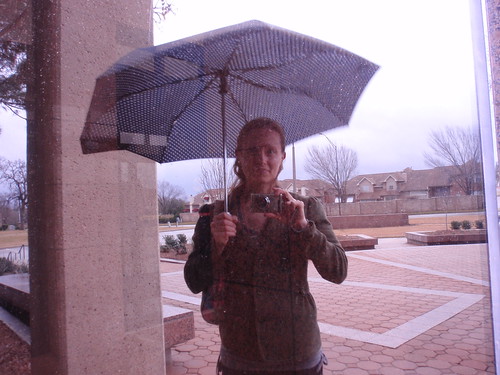I’m still glowing with happiness over here, even though today is grey and rainy. The winds are so strong out there that they almost snatched my umbrella out of my hands! But now, I’m back inside, sitting on my cozy blue couch, writing to you, and I am calm and happy and well-fed. Life is good.
Before I tell you about this week, I want to confide that when I returned to Texas from Michigan, I did not want to go back to work. It was a deep, visceral feeling that nagged at me for four days while I struggled to reacquaint myself with my work rhythms. I did not want to take care of my flies, I did not want to start doing experiments again, I did not want to look at data or think about science. In short, I wanted to stay on vacation forever. That didn’t happen, of course, because I’m not independently wealthy. Even if I’d had an extra week or two of vacation, eventually I knew I would want to go back to work because really, I love my work. I just hate going back to work when I have no food to eat, a huge pile of laundry to do, and what can only be described as an emotional hangover from the holidays.
But during that week, my boss asked if I would be up for giving a talk to the whole department the next week, and I said yes. I knew there was a good chance I would be giving a talk in January since he had mentioned it back in December, but getting the official notice meant that I had to end my whining and get back in the science saddle. So that’s what I did. I prepared my talk for its first vetting by my boss, and I made a bunch of revisions. Two days later, I presented the talk to my lab, listened to my colleagues’ comments, then made more revisions. The next day, I presented my talk to the whole department, which is an incredibly diverse group of scientists: we have people who study everything from intracellular transport to DNA replication to cancer to behavior. This talk was my first opportunity to show my work to people outside my lab, and I had no idea what to expect from the audience. As much as I feel confident about my decision to pursue my project, I have a certain amount of healthy anxiety about what other scientists might think. They could think I’m full of crap, for example. And while I am not a very confrontational person, it would be my professional duty to defend my work and more importantly, to explain it in such a way that it makes sense to my general science audience.
But I’m lucky in that I’ve grown up in labs that hold themselves to a very high standard. If I could convince my boss that my project has merit, then surely the department would be an easier sell! After all that work—two practice runs, two rounds of revision, and several hours of rehearsing by myself—my talk went beautifully. There were lots of questions afterward, but they were all of the curious variety, not the “I think you are full of crap” variety. The new chair of my department asked an insightful question about the topic, revealing the end of our knowledge about the area in which I’m working. I always find it sort of liberating to say, “Nobody really knows how that works,” because it both validates the question and allows me to acknowledge that I understand the importance of the question. And when nobody knows how it works, it means the field is wide open for discovery. That’s exciting.
As a general rule, I think that asking other people to validate your decisions can be dangerous. But it was so wonderful to give a talk that was well-received and to listen to other people’s enthusiasm about the project. I felt lifted up by the reaction from my department, and it was really the perfect antidote to my post-holiday slump. During my first week back at work, I gave myself a pep talk in which I said, “You are doing it! You are bringing this project, this knowledge, into existence. And that’s just so cool—to be the medium that is generating new knowledge about a poorly understood topic*.” I feel like I’ve finally found a way to bridge the gap between my intellectual interests and my need to connect spirituality to my work. By seeing myself as a medium for science, I can acknowledge the weird relationship I have with my work where failure is a routine part of the job. But sometimes, everything comes together, and we begin to weave the data into a story. In those moments, when I can see the fibers creating something lovely and strong, I remember why I wanted to be a scientist in the first place.
* I study female sexual behavior in fruit flies. You can read more about my work in the interview I did for Amber, “Featured Career: Scientist.”


3 comments:
I love this post! Congratulations on an excellent talk, and even bigger congratulations on loving what you do (even though it can be hard sometimes).
i, too, did not want to return to work after vacation... just one.more.week. sounds like you've had an amazing start to 2013, just what you needed, i think. it's going to be a good one for you, rose-anne!
Thanks, Chrissy! That part about how things we love are hard sometimes is important to remember...and to teach our students, I think.
Hee hee! We should make it a chant: ONE MORE WEEK! I hope your 2013 is off to a good start, Shannon.
Post a Comment